For Shannon Attanasio, the road to becoming Medicaid Health Plans of America's newest lobbyist started somewhere around 2008, when she was canvassing for Barack Obama's 2008 presidential campaign.
Again and again, she tells FierceHealthcare, the people she encountered underscored how important healthcare is as both a political issue and in people's lives.

"That’s always the No. 1 on thing on folks’ minds—they want to have coverage, but they want to be able to use that coverage and they want to be able to afford it," she says.
Those experiences drove Attanasio to a career path that most recently found her helping the group Families USA fight against Medicaid cuts. And to her, joining MHPA is a natural extension of that work, because the more prevalent managed care becomes, the more power health plans have to improve the lives of vulnerable populations.
“I’m really interested in being in MHPA now because I think that managed care is the way of the future,” she says. “We already have the vast majority of enrollees there, and I think we’re doing a lot of things well, and we can continue to do things better.”
Indeed, 73% of all Medicaid beneficiaries in 2017 were in managed care plans, according to consulting firm PwC. Over the past five years, an additional 20.9 million people were served by a managed care plan, while 3.1 million fewer were served by Medicaid fee-for-service.
While managed care has become more prevalent, that only increases health plans' responsibility to improve care for the growing number of beneficiaries it serves, Attanasio says.
For example, she thinks more can be done to improve the “suboptimal” care coordination provided to the population that’s dually eligible for Medicare and Medicaid. To do that, she suggests states set up models that financially incentivize health plans and other entities to better coordinate care for those beneficiaries.
RELATED: Dual-eligible pilot program shows promising early results
In addition, “we have a lot of work to do generally with better integrating behavioral health and physical health,” Attanasio says, adding that it’s become even more important now that the country is in the throes of an opioid epidemic.
“You really want folks that can manage both sides of a person, because otherwise they’re not getting coordinated care and you’re not taking care of the whole person,” she said. “It doesn’t matter if someone is getting their heart medication if they have these other issues that haven’t been addressed.”
Beyond those care management issues, Attanasio expects MHPA to lobby for policies that address rising costs in the healthcare system. To tackle one of the major cost drivers—prescription drugs—the trade group supports correcting “misaligned incentives” in the Medicaid drug rebate program, she says.
In fact, Massachusetts has already taken a step to address that issue by applying for a Medicaid demonstration project that would give the state the power to negotiate discounts for the drugs it purchases and to exclude drugs with limited treatment value.
Such state-led pilots—including Trump administration-supported programs that would place work requirements on beneficiaries—are almost certain to be the big story in the Medicaid program this year, according to Attanasio. Ditto for other nonlegislative changes.
“A lot of the energy [last] year was around what was happening on the Hill on healthcare,” she says. “But especially with all of the waivers that may be approved—and of course, there’s a rewrite of the managed care rule—I think more activity will be at the administrative level.”